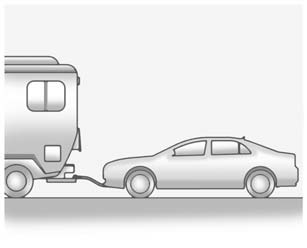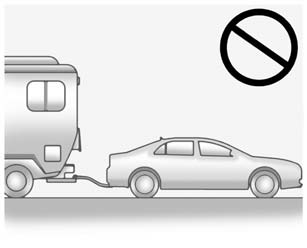Chevrolet Sonic Owner's Manual: Dinghy Towing All except RS Model with Automatic Transmission
When dinghy towing a vehicle with an automatic transmission, the vehicle should be run at the beginning of each day and at each RV fuel stop for about five minutes. This will ensure proper lubrication of transmission components.

To dinghy tow the vehicle from the front with all four wheels on the ground:
1. Position the vehicle to tow and then secure it to the towing vehicle.
2. Shift the automatic transmission to P (Park) or a manual transmission into 1 (First) gear and turn the ignition to LOCK/OFF.
3. Set the parking brake.
4. To prevent the battery from draining while the vehicle is being towed, remove the following fuse from the instrument panel fuse block: (DLIS). See Instrument Panel Fuse Block for more information.
5. Turn the ignition to ACC/ ACCESSORY.
6. Shift the automatic transmission to N (Neutral) or a manual transmission to Neutral.
7. Release the parking brake.
Remember to reinstall the DLIS fuse once the destination has been reached.
Caution
If 105 km/h (65 mph) is exceeded while towing the vehicle, it could be damaged. Never exceed 105 km/h (65 mph) while towing the vehicle.

Caution
Towing the vehicle from the rear could damage it. Also, repairs would not be covered by the vehicle warranty. Never have the vehicle towed from the rear.
 Dinghy Towing RS Model with Automatic Transmission
Dinghy Towing RS Model with Automatic Transmission
Caution
If the vehicle is towed with all four wheels on the ground, the drivetrain
components could be damaged. The repairs would not be covered by the vehicle warranty.
Do not tow the vehicle ...
 Dolly Towing from the Front
Dolly Towing from the Front
The vehicle can be towed from the front using a dolly. To tow the vehicle using
a dolly, follow these steps:
1. Attach the dolly to the tow vehicle following the dolly manufacturer's instruct ...
Other materials:
CD Player
The CD player can play audio CDs and MP3 CDs.
The CD player will not play 8 cm (3 in) CDs.
Care of CDs
Sound quality can be reduced due to disc quality, recording method, quality of
the music recorded, and how the disc has been handled. Handle discs carefully and
store them in their original ...
Evaporative Emission Canister Vent Solenoid Valve Replacement
Evaporative Emission Canister Vent Solenoid Valve Replacement
Callout
Component Name
Preliminary Procedures
Disconnect the battery negative cable. Refer to Battery Negative
Cable Disconnection and Connection.
Remove the e ...
Front Wheel Drive Shaft Seal Replacement - Torque Converter Housing Side
Front Wheel Drive Shaft Seal Replacement - Torque Converter Housing
Side
Callout
Component Name
1
Front Wheel Drive Shaft Oil Seal Assembly
Special Tools
DT-23129 Universal Seal Remover
DT-47790 Seal Insta ...
0.0053
